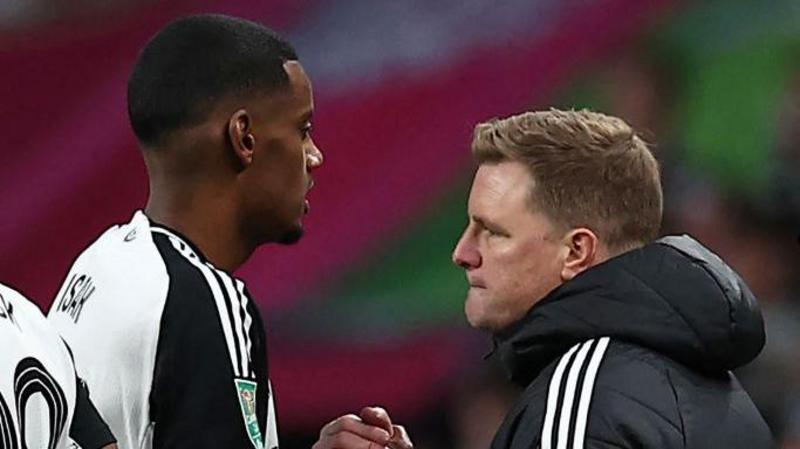Howe Reveals Isak's 'Strike' Dramatically Altered Their Relationship




Newcastle United manager Eddie Howe recently shed light on a compelling development within the club – the transformation of his interpersonal dynamics with star striker Alexander Isak. This revelation surfaced when Howe disclosed that their relationship shifted after Isak's controversial decision to go on "strike" during an essential period of the Premier League season.
The drama unfolded when Isak, the talented Swedish international who joined Newcastle United for a club-record fee, reportedly refused to train due to unresolved disputes concerning contractual commitments and team management issues. This bold move by Isak sparked a range of responses, from bewildered fans to critical sports analysts who began questioning the future impact on team morale and the club's performance.
It's not every day that relationships inside a football club take such a dramatic turn, especially involving a key player like Isak, whose skills on the field have been crucial for Newcastle. Since arriving at St. James' Park, Isak has been a revelation, showing flair and scoring vital goals, which makes any discord between him and the management a significant affair.
In discussing the matter, Eddie Howe opened up about the series of events from his perspective. "You always hope to maintain a smooth and open rapport with all your players," Howe stated, indicating his initial surprise at Isak's actions. "But, real life in football often writes its own stories, and Alexander felt he needed to make a stand. While it was a challenging period, it opened up new dialogues between us."
Howe's approach to resolving the tension was focusing on communication and understanding the player's perspective. The resolution required not only addressing the immediate issues head-on but also paving the way for rebuilding trust and ensuring such disagreements could be handled more constructively in the future.
Isak's decision to go on strike, although drastic, highlighted the often complex relationships between a club's management and its players. Such situations demand swift and sensitive handling, ensuring that both parties can move forward without lingering resentment. Howe has been known for his player-friendly coaching style and his ability to manage individual players' concerns effectively, which proved essential in navigating this crisis.
Reintegrating Isak into the team dynamics following his return from the strike was another hurdle Howe and his coaching staff needed to manage carefully. Ensuring that the squad remained united and focused on their collective goals was paramount. Howe's handling of the situation seems to have paid off, with Isak returning to the fold and continuing to perform at a high level on the pitch.
The incident serves as a reminder of the pressures and the high stakes involved in top-tier football, where player management is just as crucial as game tactics. Clubs not only invest vast sums in recruiting talent but also in managing the diverse personalities and expectations of their players.
For Newcastle United, maintaining a harmonious locker room while dealing with the pressures of competing in one of the most demanding football leagues in the world is always a top priority. As they navigate the Premier League and look forward to European competitions, the ability of Howe and his team to manage player relationships effectively will be just as scrutinized as their match strategies.
Overall, the situation with Alexander Isak was a significant learning curve for both the player and the club. It has underlined the importance of open communication and has possibly set a new precedent for handling player grievances in the rapidly evolving landscape of modern football. As both parties look ahead, the hope is that this episode will strengthen the team's resolve rather than weaken it, fostering an environment where challenges are met with unity and resilience.